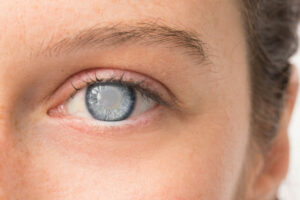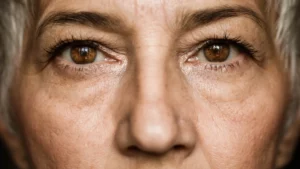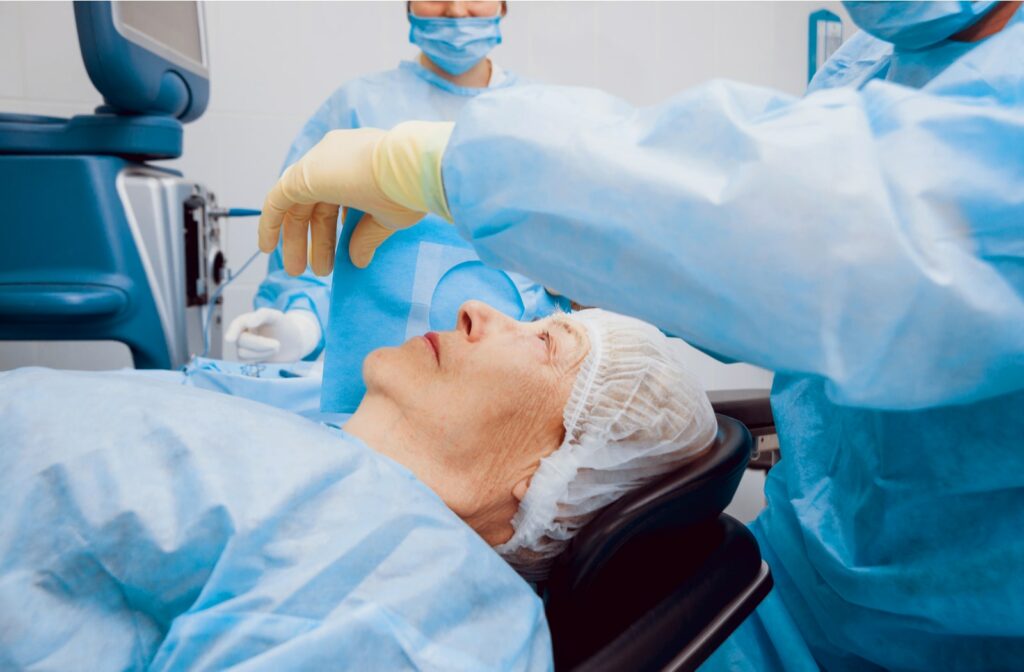If you are one of the millions of people who suffer from riders’ cataracts, then you know how debilitating it can be. This condition can make it difficult to see, and often causes a great deal of discomfort. In this blog post, we will discuss a riders cataract in detail and provide information on the latest treatments available. We hope that this information will help you better understand your condition and make informed decisions about your treatment options.
Contents
What Are Riders’ Cataracts?
 The rider’s cataracts are often known as zonular cataracts, a rare form of congenital cataracts. It affects the zonules, which are the thin strands of connective tissue that hold the crystalline lens in place within its capsule. Riders’ cataracts usually occur as unilateral or bilateral opacities, often with a rope-like appearance on slit lamp examination.
The rider’s cataracts are often known as zonular cataracts, a rare form of congenital cataracts. It affects the zonules, which are the thin strands of connective tissue that hold the crystalline lens in place within its capsule. Riders’ cataracts usually occur as unilateral or bilateral opacities, often with a rope-like appearance on slit lamp examination.
‘Riders’ arecortical opacifications that appear wedge-shaped and radiate from the inner cortex of the lens towards the equator, though little is known about how they develop. It is estimated that 1 in 25,000 people are affected by riders’ cataracts.
Therefore, if you are diagnosed with riders’ cataracts, your doctor may advise on several treatments to help manage the condition.
What Are Some Signs To Look For?
If you suspect that you or a loved one may have riders cataract, there are a few signs to look for. This condition can affect the vision of both eyes and cause:
- Changes in color perception
- Blurred vision
- Difficulty seeing at night
- Double vision
- Light sensitivity
- In rare cases, complete blindness.
Additionally, there are also some other signs that you may have with this type of cataract such as:
- Cloudy or foggy vision
- Halos around lights
- Glare or starbursts when looking at bright light sources
- Decreased contrast between colors
- Trouble reading and concentrating
- A feeling of fatigue in your eyes
- Inability to focus on near objects
All in all, it is important to be aware of the potential signs and symptoms of riders cataracts. And to schedule an appointment with your doctor if you experience any of the above-mentioned symptoms. Early diagnosis and treatment can help restore your vision and reduce complications.
What Causes Riders Cataracts?
There are several factors that can contribute to the development of riders cataracts. These include:
- Genetics: This can be a factor in some cases. Riders cataracts can run in families and be passed down from generation to generation.
- Exposure to sunlight: Prolonged exposure to bright light, especially UV light, can damage the lens of the eye and lead to this cataracts.
- Age: Cataract formation tends to increase with age, so older riders are more at risk of developing cataracts.
- Injury or trauma: Trauma to the eye can cause damage that leads to cataract formation.
- Chronic diseases: Certain chronic conditions, such as diabetes, can put riders at a higher risk of developing cataracts.
- Medications: The long-term use of certain medications, such as corticosteroids, can increase the risk of cataract formation.
These are all factors that may increase the risk of this type of cataract. It’s important to be aware of them and take steps to protect your vision. And then, you can be sure of a healthy, active lifestyle. So, do not forget to wear sunglasses when riding and get eye exams on a regular basis.
How Is It Diagnosed?
Diagnosis is a vital part of treating riders’ cataracts, and it is usually done with a series of tests. An eye exam will be conducted to check for any abnormalities in the lens or other parts of the eye. The doctor may also use ultrasound imaging to look for signs of the condition in the cornea.
There are some other tests also that can be done to confirm the diagnosis of riders’ cataracts, such as measuring refraction and visual acuity. The doctor may also use a fundus camera or other imaging techniques to take pictures of the inside of your eye.
So, do not forget to talk to your doctor if you think that you might be suffering from this condition. With the right diagnosis and treatment, riders’ cataracts can be managed effectively.
What Treatment Options Are Available?
 The good news is that riders’ cataracts can be treated effectively with a range of treatments. Depending on the severity of your cataract, you may be able to opt for different options. These include:
The good news is that riders’ cataracts can be treated effectively with a range of treatments. Depending on the severity of your cataract, you may be able to opt for different options. These include:
Corrective lenses
It is one of the most basic and effective treatments for riders’ cataracts. Wearing corrective lenses can help improve your vision and reduce the impact of your cataract on your daily life. It works by correcting any visual distortions caused by the cataract. For example, when you wear glasses, they can help reduce the glare and blurriness that is associated with riders’ cataracts.
Cataract surgery
Alternatively, you may choose to have cataract surgery. This is an outpatient procedure and usually only takes 15 minutes to complete. During the surgery, a tiny incision is made in your eye and an artificial lens is inserted into place to replace the cloudy natural lens. Following this procedure, most people experience an improvement in their vision.
Laser therapy
For mild cases of riders’ cataracts, laser therapy may be a good option. During this procedure, a laser is used to break up the cloudy lens and replace it with a clear one. This can help reduce the impact of the cataract on your vision and improve the clarity of your sight. It works best for small and early-stage cataracts.
Supplements
This also plays a vital role in the overall functioning of our bodies. There are some supplements that are helpful for riders’ cataracts. These include omega-3 fatty acids, lutein, and zeaxanthin. Omega-3 fatty acids help reduce inflammation in the eyes, while lutein and zeaxanthin help protect the eyes from oxidative damage caused by sunlight. Additionally, some studies have found that taking vitamin E can also be beneficial for riders with cataracts.
Dietary changes
It is also important to understand the dietary considerations of riders cataract. A diet that is low in sugar and high in protein, healthy fats, vegetables, and fiber may help reduce the severity of riders cataract. Additionally, it is important to avoid processed and refined foods as they can contribute to inflammation in the eyes. Be sure to include foods like salmon, tuna, walnuts, and flaxseed in your diet.
Lifestyle changes
Finally, it is important to make some lifestyle changes that can reduce the risk of this cataract. These include exercising regularly and avoiding smoking. Additionally, wearing sunglasses when outdoors and making sure your eyes are protected from the sun’s ultraviolet rays can help in reducing the chances of developing this cataract.
All in all, these are a few things you should know about Riders Cataract. It is important to take the necessary precautions and lifestyle changes in order to reduce your risk of developing this cataract. Furthermore, if you do feel that you have symptoms related to it. Then it’s best to get it checked by a doctor immediately for diagnosis and treatment.
Early detection and proper treatment are your best defense against this cataract, so make sure to stay on top of it and keep your eyes healthy.
Conclusion
In conclusion, riders cataract is a very serious condition that can cause vision loss and other sight-related issues. It is important for all riders to be aware of the potential risks associated with riding in high temperatures and extreme weather conditions, as well as to take steps to protect their eyesight while on the road.
By wearing appropriate eye protection, avoiding direct exposure to sunlight, and keeping a healthy diet, riders can reduce their chances of developing cataracts. Additionally, it is important to recognize the early warning signs and seek immediate medical attention if any symptoms appear.
For more information and guidance, be sure to contact Mantra Care. At MantraCare we have a team of experienced eye surgeons, who will be happy to answer any questions on cataract surgery. Call us at +91-9711116605 for any inquiries.
